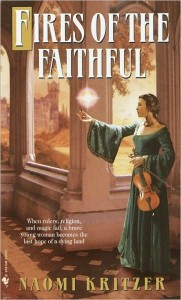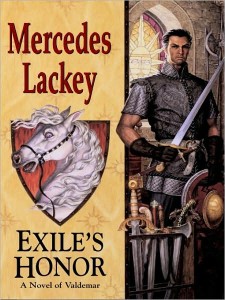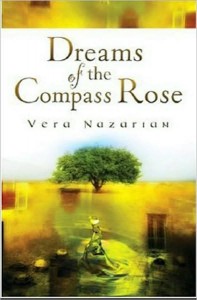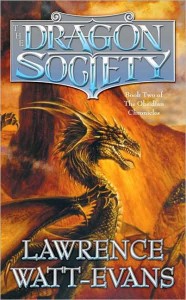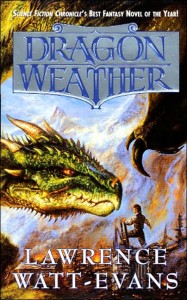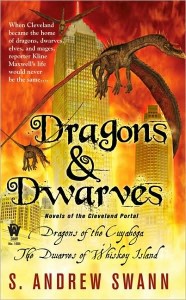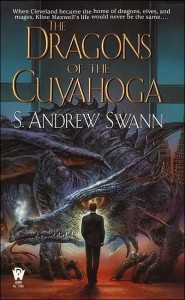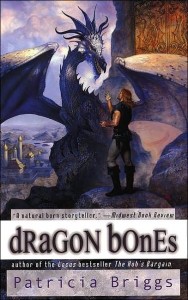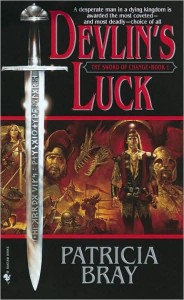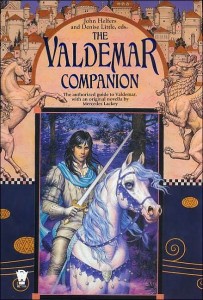
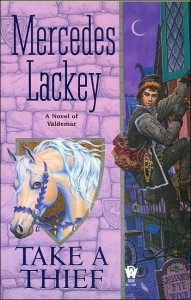 The Valdemar Companion, edited by John Helfers and Denise Little (Daw, 2001)
The Valdemar Companion, edited by John Helfers and Denise Little (Daw, 2001)
Take a Thief (Daw, 2001)
The Black Swan (Daw, 1999)
Spirits White As Lightning (With Rosemary Edghill) (Baen, 2001)
In 1987, Mercedes Lackey crept onto the fantasy scene with her debut novel, Arrows of the Queen. Previously known only for her song lyrics and several short stories, no one could have guessed that she’d eventually become a major author, the sort who takes up an entire shelf in the bookstore. Little did we know at the time.
Arrows of the Queen was our initial introduction to the magical world of Velgarth, and the enigmatic, fascinating land of Valdemar, a land devoid of true magic, but guarded by incorruptible, fearless white-garbed men and women riding Companions, sentient blue-eyed white horses. We were given our initial tour into the world of the Heralds through Talia, a young woman whose creative mind was slowly being stamped into oblivion by her tyrannical, uncaring family and their harsh border lifestyle. When she ran away from home, and literally fell at the hooves of one Companion, it was the start of a fifteen-years-and-counting journey through magic and mayhem.
The initial Arrows trilogy detailed Talia’s progress from ignorant, unloved child to confident Herald, one possessed of a rare Gift and an even rarer position: that of Queen’s Own, the Herald responsible for advising and protecting the Queen herself. Talia’s story took us through Valdemar, detailing the ways and traditions of the Heralds, introducing us to their legends, and opening the way for tragedy, triumph, and war.
As Mercedes added to the Valdemar books, we were thrown back in time to see the life and death of the Last Herald-Mage, Vanyel Ashekevron. We went back even further to the ending of one civilization and the beginning of another in the Mage Wars trilogy. We journeyed to faraway lands for the Vows and Honor duology, and By The Sword, which linked the various series in time for a truly epic pair of trilogies, the Mage Winds and Mage Storms series. Along the way, she turned out quite a few short stories for Marion Zimmer Bradley’s Fantasy Magazine and the Sword and Sorceress anthologies, many of which have been collected in one form or another. More books followed, detailing more characters, other aspects of the world. And finally, someone got the brilliant idea to actually collate all of this vast amount of information, and put out The Valdemar Companion.
Weighing in at nearly 500 pages, the Companion is everything you’ve ever wanted to know about the Valdemar novels, short stories, associated songs, characters, places, histories, and people who’ve helped flesh them out, and then some. Fully half the book is devoted to an impressive Concordance written by Teri Lee, Juanita Coulson, Kerrie Hughes, and Denise Little. Every name, every term, every place referenced in any of the numerous books or stories has an entry here. Just bouncing from one entry to another is addictive, and fun. No matter how minor or brief an appearance they might have made, they’re in here.
Mercedes herself contributes an all-new novella, A Herald’s Journey, which serves as a primer, tour, and refamiliarization of the process of becoming a Herald, from that initial Choosing by a Companion, to the grueling years of education and training at the Collegium, to the final trial by fire out in the real world. It’s a fun story, which helps to introduce new readers to what it’s all about, and update old readers on some of the changes which Valdemar has undergone since the first time we visited the land back in Arrows of the Queen.
Denise Little contributes a lengthy, no-holds-barred, fascinating interview with Mercedes that covers just about every question I’d ever wanted to ask, and a few more. This is the comprehensive, “get to know Misty” conversation, and it’s immensely information.
Kerri Hughes gives us “A Traveller’s Guide to Valdemar and the Surrounding Kingdoms,” which is basically Fodor’s Velgarth, or perhaps Valdemar on Five Pennies a Day. Again, it’s a comprehensive collection of everything we know about Valdemar and its neighbors over fifteen years of publication.
Former Tempest band member Michael Longcor, who has long been associated with Mercedes and the musical side of her works, gives us an essay on “Balladeers, Buskers, and Bards: The Music of Valdemar.” As Mercedes has always been drawn to music, and many of her books actually do come with some form of a soundtrack, it’s important that we understand just how much music and song is woven into the nature of her works. Bards, like Heralds, play a large part in Valdemarian society, and other non-Valdemar books have focused on Bards as the main characters.
With this in mind, we also have Teri Lee’s “Born in Song: Making the Music of Valdemar,” which focuses on the relationship and evolution between a handful of songs, and what has become a series twenty-six books and ten albums strong at last count. Following that is John Helfers, with “A Discography of the Songs of Valdemar.” This details every album with music inspired by, or pertaining to the Valdemar books, as well as the titles of the songs, and who performed them. Prominent names here include Mercedes Lackey, Michael Longcor, Meg Davis, Cecilia Eng, and Leslie Fish, all of whom have had a major presence in the Celtic rock community, or the filking community (filk being music inspired by science fiction or fantasy, often parodying or paying homage to established tunes).
Denise Little turns in “A Conversation With Betsy Wollheim,” the president and co-publisher of Daw Books, and the editor who first handled Mercedes when she was just starting out with Daw. It’s another interesting look at the process that brought a writer from obscurity to the big leagues.
Thankfully, one aspect of this book is “The Novels of Valdemar,” written by Denise Little and Kristin Schwengel. This handy feature is a chronological-by-publication-date summary of every book and short story published about the world of Valdemar’s setting. Spoiler-haters beware, this gives the whos and whats for every book, in short form, to catch new readers up on what they’ve missed, and refresh the memories of old readers.
Russell Davis gives us a short essay on “Virtual Valdemar.” Where can you find those fan clubs and chatrooms and discussion lists online? Here’s your answer, as accurate as any print essay about the Internet can be.
Finally, Larry Dixon and Daniel Green collect all of the known maps for Valdemar and the other lands featured in the books. These are beautiful, detailed, elegant works of art, typical for Dixon, who has acted as resident artist and occasional co-writer, as well as Mercedes’ ever-loving husband.
I am in awe of the vast amounts of material gathered, and the splendid way in which it is all presented. The Valdemar Companion is a perfect example of what to do when putting together a reference work based on someone’s writing.
The essays are informative and well-crafted, the discography and bibliography are useful, and the Concordance is downright indispensable. Add in the new novella, and you have a well-packaged book that’s more than worth the price of a hardback. And as always, Jody A. Lee, who’s contributed quite a few covers for Mercedes’ books, has turned in a simply gorgeous, utterly evocative cover which conveys the feeling of Valdemar perfectly. Whether you’re a new fan or old, this is a book that belongs on your shelf next to the Valdemar novels.
The newest novel in the Valdemar saga actually takes place in the years before Arrows of the Queen, and focuses solely upon one of the best-loved characters from that period: the rapscallion pickpocket-turned-Herald known as Skif. Up until this point, we knew very little about him. We knew he was an orphan of sorts, that he grew up on the streets, that he was a thief and pickpocket of great skill and dubious morals, and that his first encounter with a Companion started with his trying to steal the horse, and ended with his being Chosen as a Herald. We knew that a certain high-placed lord hated him, enough to constantly try and get Skif expelled, and that he never did quite give up his roguish ways. In Take A Thief we get his story from the beginning, at last.
It all starts out with Skif leading a life of quiet squalor, working for his loutish uncle at the Hollybush Tavern, the sort of place even the roaches tend to avoid lest they become part of the daily meal. Skif’s only relief from this lousy life comes in the mandatory education provided for free at the temples, and the meal that goes along with it. Skif’s good at making time for himself, and sneaking into the houses of the nobility for food, small things he can steal, and a warm place to sleep.
One time though, he meets someone else with the same idea. Luckily, they hit it off, and thus Skif is ultimately introduced to Bazie, a crippled man who acts as Fagin, ringleader, mentor, surrogate father, and protector to a small, talented band of con artists, pickpockets, second story thieves, and more. When tragedy befalls the Hollybush, Skif’s destiny seems clear. He joins the group, and his talents are exploited to their fullest extent. Life, while never dull, is good.
Things never stay good for long, though. As Skif grows into his teenage years, a conspiracy strikes straight to the heart of his life, and he again finds himself alone, on the run, and out for vengeance against the people who let it happen. One thing leads to another, and as has been said, he runs afoul of the wrong horse, and ends up as a Herald-Trainee. There, he meets the formidable Alberich, Weaponsmaster, Herald, and occasional spy. Together, they hatch a plan to bring down a traitor, expose a conspiracy, and eradicate a gang of nasty predators. Perhaps the Companions didn’t make a mistake when they Chose a thief like Skif. Perhaps he has a part to play after all….
Take A Thief is several parts rollicking adventure in the truest Valdemar style, and several parts Dickensian orphan-makes-good. Skif’s life is like something straight out of Oliver Twist, bleak and corrupt and nasty, at least until he meets the people who change his life completely. This book looks back to the atmosphere of the first Heralds trilogy, and answers a few of those long-standing questions as it fills in backstory. It’s exciting, cunning, clever, bold, and pure Skif, all the way. Even if you’re completely new to the world of Valdemar, it stands on its own quite nicely. If you’re an old fan, you’re sure to enjoy seeing the return of a favorite character or three, and finding out how certain people and things got to be as they are by the time Talia arrives on the scene.
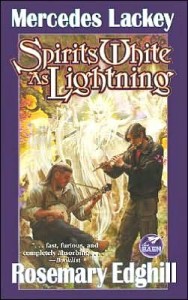
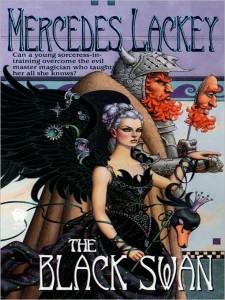 Mercedes Lackey has proven an ability to write in a number of genres. Besides fantasy, she’s done urban fantasy, and science fiction. She’s also written several stand-alone novels inspired by fairy tales, one of which is The Black Swan.
Mercedes Lackey has proven an ability to write in a number of genres. Besides fantasy, she’s done urban fantasy, and science fiction. She’s also written several stand-alone novels inspired by fairy tales, one of which is The Black Swan.
Odile Von Rothbart is the only daughter of a very powerful and very ambitious wizard who’s mastered the arts of shapeshifting and cursing. The good baron has captured a number of beautiful women who he swears have wronged men, and transformed them into a flock of swans who spend all but the light of the moon in their bird forms. Odile, ever-desirous of pleasing her father, has mastered some magic of her own, including the secret of transformation. As a swan herself, she tries to help and befriend her father’s erstwhile captives, but without ever truly questioning his motives.
Odette, the unofficial leader of the swan maidens, and a princess in her own right, is determined to find a way to reverse the spells and cancel the curse, allowing them all to go free. In a daring move, she places a challenge before the baron, one which could set them all free, or enslave them forever.
Odile and Odette will go head-to-head, and work together and separately to unravel the machinations of the baron and foil his fiendish plans. If they can’t, they’ll never be free, and a kingdom will be destroyed. But can a fledging sorceress and a transformed princess win the love of a prince and foil an evil wizard in time? The final confrontation will be brutal and violent, for magic unleashed always has a price. What’s worse is that Baron Von Rothbart is in league with an evil queen, and if she gets her way, no one’ll be happy.
The Black Swan takes an entirely new, magical look at the story which would someday be retold as “Swan Lake,” and does it more than justice, it does it right. It’s a modern retelling of an old fairy tale, filled with strong characters and a powerful, engrossing plot. Once I started, I couldn’t put it down.
Finally, to complete our sampler of Mercedes Lackey, we have Spirits White As Lightning, the latest in the Bedlam Bards sequence started in Knight of Ghosts and Shadows and continued in Summoned to Tourney, Bedlam Boys and Beyond World’s End.
Now that he’s finally settled down in New York City, with a fabulous apartment in the enigmatic Guardian House and a gargoyle who stops in to use his VCR, and now that he is taking classes at Juilliard, Bard Eric Banyon is doing just fine. Hey, all is cool. So he misses his friends, Kory the elf and Beth the witch, who’ve gone to live Underhill. He’s got plenty of new friends, and even an “I love you but I don’t entirely trust you yet” relationship going with his old enemy, Ria Llewellyn. And his god-daughter’s about to have her big Naming party Underhill, and Eric’s playing a very important role. So what’s the problem?
Well, there’s a renegade Black Ops chemist out there with some samples of a drug which awakens psychic talent … until it kills you. There’s an Unseleighe Sidhe lord with a hatred of all humanity and a thirst for revenge.
There’s Beth and Kory’s desire to have a crossbreed baby of their own, something damned near impossible if you don’t want to break a few metaphysical eggs (and people). (For the record, Eric fathered their first child. Go Eric.) There’s the dreaded dangers of summer school. And on top of all that, Eric’s picked up an apprentice Bard who plays the banjo, and has a punk-gothlet Healer friend hanging out for the time being. How much is one guy supposed to juggle?
As Eric explores the mystery of his new Bardic friend, Hosea, Kory and Beth journey into the unpredictable depths of Underhill, looking for the Goblin Market, which will in turn lead them to the answers they seek. If they can survive the kitsune, elves, and dragons…. Meanwhile, the Unseleighe Aerune is out for revenge in a big way, and he’s collected a few old enemies to help even the score. It’ll take all of Eric’s skill and talent and strength and the assistance of his friends to defeat the bad guys and survive. But not everyone will get out intact.
Spirits White As Lightning is another thoroughly enjoyable, exciting, and just plain fun adventure, reuniting all of our old friends from the earlier books in the series, and pulling in a few from other books. Rosemary Edghill was the perfect choice to bring in as co-writer for this particular series, as she helps to balance the mundane and magical threats. While this is a book best read in sequence with the rest of the series, it’s still a fantastic addition to the story of Eric the Bard and his various friends, allies, and enemies. As always, I look forward to the next in the series.
Mercedes Lackey continues to be one of the best fantasy authors out there. With compelling, realistic, and multidimensional characters who challenge the typical boundaries of gender and sexuality, with fully realized fantasy worlds as fascinating and complex as any “classic” worlds, and with tight plots that never lead quite where you expect, she doesn’t disappoint. Her work of late has been wholly satisfactory at the least, spectacular at the best, and I, for one, am always glad to see a new book by her on the shelves.
Give any of these a shot, and have fun.



